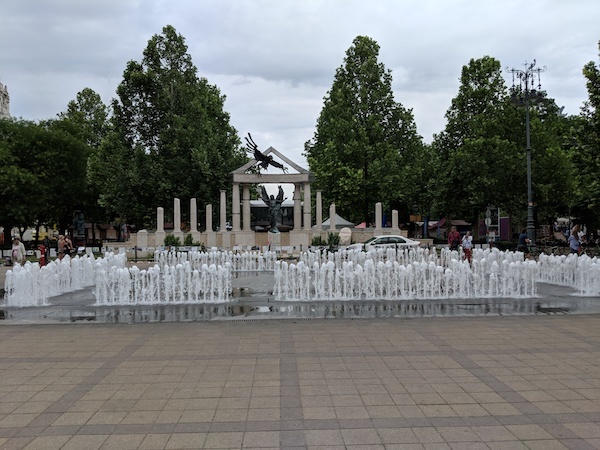Jul. 1st, 2018 07:07 pm
Budapest and then Krakow
The next day the others go on to Poland, and Doug and I have the day to ourselves. We cross the Chain Bridge

and ride the funicular up to the castle

in the morning, and in the afternoon take the Metro to the Szecheny Baths.

It’s a huge place with lots of indoor and two outdoor thermal pools (one is closed) of different temperatures, and one enormous swimming pool -- I know it’s enormous because I swim a lap and then have to give up. There are tiled floors, and statues that spray you with water, and other statues of nymphs and goddesses watching you benignly as you bathe.

There are teenagers flaunting their bodies, and fat men sitting with their stomachs floating out in front of them, unembarrassed, though fewer fat women. Why don’t we have something like this in the U.S.?

and ride the funicular up to the castle

in the morning, and in the afternoon take the Metro to the Szecheny Baths.

It’s a huge place with lots of indoor and two outdoor thermal pools (one is closed) of different temperatures, and one enormous swimming pool -- I know it’s enormous because I swim a lap and then have to give up. There are tiled floors, and statues that spray you with water, and other statues of nymphs and goddesses watching you benignly as you bathe.

There are teenagers flaunting their bodies, and fat men sitting with their stomachs floating out in front of them, unembarrassed, though fewer fat women. Why don’t we have something like this in the U.S.?
I’m not sure what I think about Budapest. I liked the energy at the ruin bars, and there’s still some Middle European charm, some fading elegance, in the coffee shops, the baths, the friezes and statues along the facades of the buildings, and the history is interesting. A lot of the city is neglected and falling down, though, and sometimes you’ll come across a Stalinist-era concrete building, turned in on itself and guarding its secrets, so ugly it’s like a blow to the face. None of this is their fault, of course, but then there’s Viktor Orbán, another man who wants to be dictator. Budapest is also much larger than Prague, so it’s harder to get a feeling for it.
When I was growing up the only people I heard speaking Hungarian were my mother and her friends, so it’s strange being in a place where you hear it all over. I rarely saw it written down, and it’s always looked like Orkish to me. “Válaszd a jövö hálózatát,” says a no doubt completely innocent sign at the airport, but it looks as though it’s giving instructions for torturing hobbits.* I wonder if Tolkien took anything from Hungarian for Orkish, the way he did with Finnish and Elvish.
The next day we fly to Krakow. We’ve been staying in airbnbs mostly so far, and they’re pleasant places, but they were all once part of large houses and they’ve been cut up into very odd geometries. The one in Budapest had a rickety outdoor elevator that smelled like plastic, tenuously attached to the building, and this new one is located along the back of a restaurant, through a courtyard, up some stairs, and across a balcony. We go to sleep and I have very weird dreams, none of which I can remember. Then we go out and walk around, through a park and up to the castle and to the main square.

We’ve had our fill of castles by this time, so we don’t go inside.


We’ve had our fill of castles by this time, so we don’t go inside.

*Google Translate says it means, “Choose the network of the future.”
Tags:


